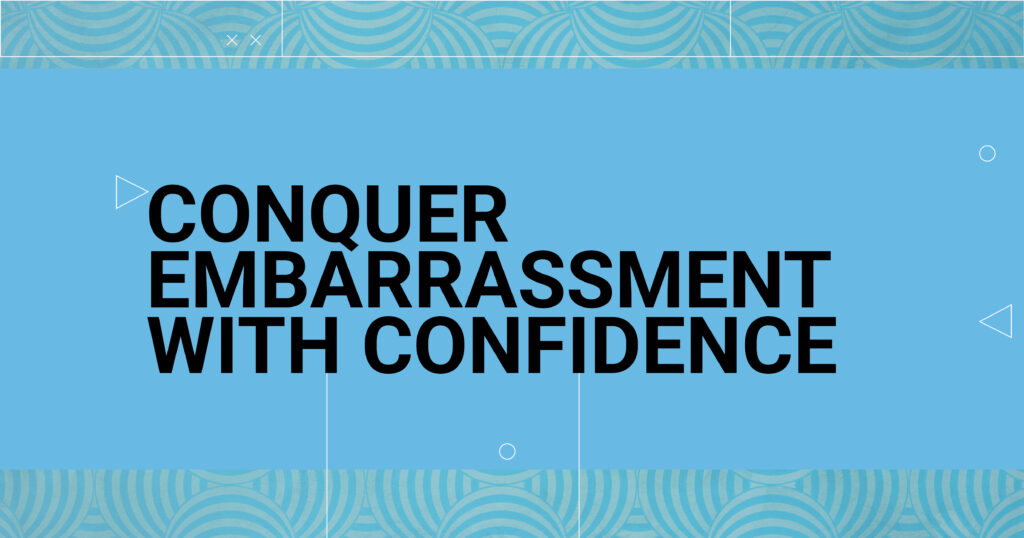Everyone has had times when they wished the earth would take us into its depths like a trap, uttering wrong words, stumbling in public, sending messages to the wrong individuals. Coping with embarrassment becomes inevitable when these moments strike suddenly and continue to haunt your mind even though others have already forgotten about it. Embarrassment functions as a basic human emotion which all people naturally experience.
Embarrassing situations produce intense feelings at particular times, yet they should not control how you see yourself or what you will do in the future. The right mindset together with emotional skills that build self-respect, enables you to transform uncomfortable situations into opportunities for overcoming embarrassment.
Understanding the Nature of Embarrassment
Embarrassment is a social emotion. Our sense of exposure and judgment from others triggers this emotion. The emotion combines what occurred with our perception of what others believe occurred. Embarrassment delivers intense stings, although people tend to forget these experiences within a few seconds. The way you react to this situation matters more than anything else, which is why embarrassment management is more effective than trying to erase the event altogether.
Embarrassment often stems from:
- Fear of negative evaluation
- Feeling “different” or out of sync with others
- Unmet expectations for how we believe we should behave
These moments become intense because our brains create the spotlight effect which leads us to believe others are focused on judging us. People normally forget embarrassing moments shortly after they first become aware of them. Understanding that these common triggers affect everyone reduces the amount of shame we feel.
Common Situations That Trigger Embarrassment
The experience of embarrassment does not only appear during extreme circumstances. It often hides in the everyday. The following situations commonly trigger embarrassment among people:
- Saying something incorrect in a group conversation
- Walking into a room and forgetting why you’re there
- Having your phone ring in a quiet place
- Being called out in a meeting or class
- Realizing you have something in your teeth
The intensity of these experiences originates from our brain’s false assumption that everyone is observing us with judgment. People tend to forget embarrassing moments as quickly as they become aware of them. The understanding that embarrassment triggers affect everyone equally decreases the amount of shame we experience.
The Psychological Impact of Embarrassment
Embarrassment creates a long-lasting effect, although its duration is brief when it hits someone’s vulnerable spot. The experience triggers an endless mental loop of the incident, which leads people to believe they appeared ridiculous. Sometimes, a small moment plays on repeat in your head. You’re not even sure why it stuck with you—it wasn’t huge, no one made a big deal—but it still hit something inside. Maybe it was the way someone looked at you, or how your voice cracked, or the awkward thing you said. It just stayed. And now, even days later, it sneaks up when you’re not ready.

You start avoiding things. You pass on speaking up, skip certain people, laugh less, just so you don’t risk feeling that way again. But hiding doesn’t help. What actually works, weirdly enough, is letting yourself feel it. Sitting with the cringe. You breathe through it. You realize you’re still standing. Eventually, it loses its grip. Not all at once, but enough for you to move forward without that weight holding you back. Embarrassment recovery requires more than time because it demands intentional handling of embarrassment and acceptance of awkwardness in human relationships.
Practical Techniques for Reducing Embarrassment
Embarrassment does not have a definitive solution to eliminate it completely, but there are proven methods to decrease its strength and accelerate recovery. These are some methods you can use:
- Breathing pauses help you control your physical reactions while bringing your thoughts back to center.
- You should direct your attention toward the people who surround you because their presence shows that your mistake does not control the entire world.
- Light Acknowledgment: A casual statement like “Well, that wasn’t smooth” can transform the moment while producing laughter instead of criticism.
- Replace Your Interpretation: Instead of calling it “I embarrassed myself” try viewing it as “The situation was uncomfortable at first but it moved on.”
- Show Yourself Kindness: The practice of self-compassion functions as a shame-blocking mechanism. Speak to yourself with the same kindness and reassurance you would offer to a friend.
Repeated practice of these methods leads to growing confidence and emotional resilience that develops over time.
Steps for Effective Embarrassment Management
Handling embarrassment isn’t about ignoring it or pretending it didn’t happen. It’s about responding in a way that maintains your self-respect and encourages personal growth. Here’s a structured approach to managing it:
| Step | What to Do |
| Recognize the Trigger | Identify the specific moment that caused the embarrassment |
| Name the Feeling | Acknowledge the emotion instead of pushing it away |
| Challenge the Assumption | Ask yourself if people really noticed or if you’re projecting judgment |
| Use Humor Gently | Light humor can take the pressure off, especially if the situation allows it |
| Move Forward | Shift your energy to the next task or moment instead of getting stuck |
Learning to manage these moments with intention gives you more control over your emotional response. Instead of shrinking in shame, you gain the tools to rise with grace.
Embarrassment Recovery: Bouncing Back With Confidence
Embarrassment recovery does not require you to deny that the incident occurred. You should extend to yourself the same compassion that you would extend to a friend in this same circumstance. Your confident recovery does not remove the initial awkwardness because it gives you control over what will happen next. The transformation of your mental perspective begins the process of building personal strength.
Confidence isn’t the absence of awkwardness. Moving past embarrassing situations becomes possible for you because you have learned to overcome their impact on your identity.
Long-Term Strategies for Handling Awkward Moments
Your response to the moment determines how you will react to future similar situations. Building long-term strategies will enable you to face challenging situations without worrying about your value and previous awkward experiences.
Some key habits to build:
- Emotional agility development involves teaching yourself to detect emotions while sitting with them and progressing beyond them while avoiding evasion.
- Build mental resilience: Practice mindfulness, journaling, or stress regulation techniques to help stay calm under pressure.
- Develop a growth mindset because embarrassment represents an opportunity to gain feedback. What can this experience teach you about your personality or the areas where your social understanding is lacking?
Mastering these skills does not guarantee you will never experience discomfort again. The recovery process will become quicker and your internal turmoil will decrease.
Regain Confidence With Support From Clear Mind Treatment
You do not need to face your difficulties while feeling embarrassed because you have others to support you. The intensity of these feelings surpasses a simple moment because they often connect to past traumatic experiences and social anxiety as well as ongoing low self-esteem issues. Professional support becomes the key factor at this point.
At Clear Mind Treatment, our therapists comprehend how ordinary social blunders tend to generate self-doubt and emotional separation within patients. Our therapists guide clients to understand the heavy emotional burden of embarrassment while teaching them to recognize patterns, create strategies for building self-assurance, and emotional stability.
Whether you’re dealing with everyday awkwardness or deeper emotional patterns, support is here at Clear Mind Treatment.

FAQs
How can I effectively cope with embarrassment in social situations?
Maintain your presence in the current moment while minimizing mental evaluation. Take a breath to stay present because most people focus on themselves so they will probably forget your mistake.
What are some practical techniques for overcoming embarrassment quickly?
You can use humor to deflect the situation while redirecting your attention to the present task and using deep breathing or physical techniques such as standing taller or releasing your jaw tension.
How does managing embarrassment contribute to improving self-confidence?
The process of dealing with embarrassment helps you develop stronger resilience. Your ability to recover from each situation shows you that uncomfortable moments will pass and you have the strength to overcome them.
What steps can be taken for reducing embarrassment in professional settings?
Maintain your composure while taking full responsibility with clarity. When an awkward situation occurs, you should address it with composure. Your confident approach to mistakes creates a stronger impact than the actual mistake could have.
How can I approach embarrassment recovery to handle awkward moments better in the future?
Take a brief moment to reflect on the event after it ends before extracting the lesson to proceed forward. The practice of dwelling prevents progress, but learning from experiences develops your capacity to manage situations better in the future.








